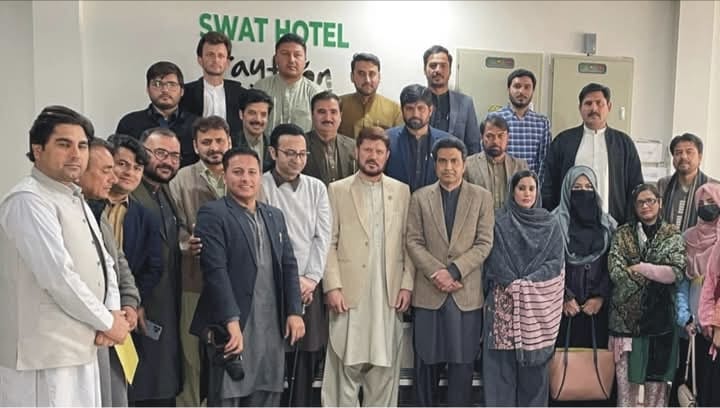
A three-day “Eco Media Workshop” on climate change reporting was held at a local hotel in Swat, organized by the Khyber Pakhtunkhwa Union of Journalists. The workshop brought together 26 journalists from various districts of the province. Experienced and renowned journalists shared their expertise and introduced participants to modern investigative reporting techniques.
Sabiha, a participant from Dera Ismail Khan, expressed, “It’s a privilege to have attended this training. For the first time, I learned that climate change also influences extremism, and that its impacts are contributing to its rise.”
Muhammad Imran, a journalist from district Malakand, emphasized, “Such trainings should be conducted across Khyber Pakhtunkhwa, especially in areas like Swat, Chitral, DI Khan, and Charsadda, which are significantly affected by climate change. This workshop was an eye-opener. Although I’ve previously produced radio programs on climate change, this training has opened new avenues for me to explore this issue further.”
Fatima Umar, a journalism student from the University of Swat, stated, “Before this, I had only heard about climate change but didn’t fully understand its implications or how it affects our lives. During the training, I realized that many events happening around us, which we once considered stories, are now real. For example, there was a natural spring near our house that has now dried up. I now understand that this is a direct impact of climate change, as groundwater levels are depleting.”
Niaz Momin, a journalist from Mardan, shared, “This training taught me a lot about climate change reporting. Most importantly, I learned how to pitch stories to organizations and effectively use social media platforms like Facebook. Although I was working on such topics before, my work wasn’t getting much recognition. Here, I gained the skills I needed.”
Ameen Ali, a journalist from district Khyber, remarked, “Climate change effects are evident in our area, but we lacked awareness about it. We have observed deforestation, irregular rainfall—sometimes too little or too much—but didn’t realize these were consequences of climate change. After this training, I’ll work on these issues and communicate their impact to the public.”
Muhammad Faheem, one of the trainers at the workshop, advised, “Journalism students should determine their area of interest or ‘beat’ early on and start conducting regular research and study. They should read newspapers daily, analyze columns and features, and acquire knowledge related to their field instead of waiting to complete their degree. This proactive approach gives them a head start.”
He further stated, “Unfortunately, many journalists avoid hard work and prefer easier beats like politics or crime, where reporting largely depends on politicians’ statements or police data. Success in journalism requires dedication and effort, especially in complex beats like climate reporting. There’s immense potential in climate journalism, yet only 1-2% of news in our media is dedicated to it, and many critical stories go unreported.”
Shams Mohmand, the workshop organizer, highlighted that the workshop was part of the Intersectional Leadership Program aimed at raising awareness about climate change. He emphasized that “local journalists and digital media are the best tools to achieve this goal. Journalists from the most vulnerable regions of Khyber Pakhtunkhwa can identify climate issues and inform elected representatives and provincial authorities, enabling timely action to prevent potential loss of lives and property.”
Amjad Ali Khan, Commissioner of Malakand Division, acknowledged that Pakistan, like the rest of the world, is facing the impacts of climate change. He stated, “The Khyber Pakhtunkhwa government is working urgently to combat climate change. Electric public transport will soon be introduced in districts like Swat, Kohat, and Dera Ismail Khan, allowing people to travel at lower fares in eco-friendly vehicles instead of smoke-emitting ones.”
At the conclusion of the workshop, Commissioner Malakand Division distributed certificates to participating journalists. Workshop organizer Shams Mohmand announced a climate change reporting competition, where prizes will be awarded to the top three journalists for outstanding video and text-based reporting.


Leave a Reply